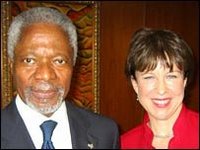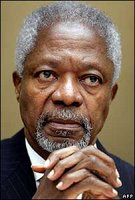Kofi Annan's Exit Interview
A proud man leaves the world stage with his humility, honesty, and integrity intact.
Outgoing UN secretary general Kofi Annan gave his last BBC interview to Lyse Doucet. He steps down on 31 December and will be succeeded by South Korea's foreign minister Ban Ki-moon.
Below are my excerpts from BBC's excerpts from the interview:
BBC: There follows in this interview a series of exchanges where Lyse Doucet persistently tries to get The Secretary-General to say whether Iraq is in a state of civil war, up or down. Evasive and diplomatic until the end, Annan states the truth.
There follows in this interview a series of exchanges where Lyse Doucet persistently tries to get The Secretary-General to say whether Iraq is in a state of civil war, up or down. Evasive and diplomatic until the end, Annan states the truth.
Kofi Annan:
BBC:
BBC:
Kofi Annan:
BBC: Unstintingly, Lyse Doucet presses the Secretary-General on Darfur.
Unstintingly, Lyse Doucet presses the Secretary-General on Darfur.
BBC:
BBC:
Kofi Annan: Lyse Doucet winds up the interview by asking about Annan's biggest regret:
Lyse Doucet winds up the interview by asking about Annan's biggest regret:
Kofi Annan:

Outgoing UN secretary general Kofi Annan gave his last BBC interview to Lyse Doucet. He steps down on 31 December and will be succeeded by South Korea's foreign minister Ban Ki-moon.
Below are my excerpts from BBC's excerpts from the interview:
BBC:
Was the invasion of Iraq in 2003, without a Security Council resolution, the most difficult point for you in your term?Kofi Annan:
It was extremely difficult, because I really believed that we could have stopped the war and that if we had worked a bit harder - given the inspectors a bit more time - we could have.
I was also concerned that for the US and its coalition to go to war without the consent of the Council in that particular region, which has always been extremely controversial, would be extremely difficult and very divisive and that it would take quite a long time to put the organisation back together, and of course it divided the world too . . . .
 There follows in this interview a series of exchanges where Lyse Doucet persistently tries to get The Secretary-General to say whether Iraq is in a state of civil war, up or down. Evasive and diplomatic until the end, Annan states the truth.
There follows in this interview a series of exchanges where Lyse Doucet persistently tries to get The Secretary-General to say whether Iraq is in a state of civil war, up or down. Evasive and diplomatic until the end, Annan states the truth.Kofi Annan:
I think, given the level of violence, the level of killing and bitterness and the way that forces are arranged against each other. A few years ago, when we had the strife in Lebanon and other places, we called that a civil war. This is much worse.BBC:
You must in some way feel sadly vindicated - in 2003, in March, you said that: "A war can lead to unintended consequences, producing new threats and new dangers."Kofi Annan:
. . . . Was it a mistake? Some Iraqis say that life is worse than it was under a dictator.
I think they are right in the sense of the average Iraqi's life. If I were an average Iraqi obviously I would make the same comparison, that they had a dictator who was brutal but they had their streets, they could go out, their kids could go to school and come back home without a mother or father worrying, "Am I going to see my child again?" And the Iraqi government has not been able to bring the violence under control.. . . .
The society needs security and a secure environment for it to get on - without security not much can be done - not recovery or reconstruction.
BBC:
Because there's no denying the risks at stake here - you met Middle East leaders this summer, they said to you that the whole region had been radicalised and destabilised. In fact, they said it was a disaster.Kofi Annan:
This is the feeling of the leaders in the region and in the streets as well.In true BBC fashion, Lyse Doucet asks the tough questions of the retiring Secretary-General:
The people are worried - they are worried about the future, they are worried about the broader Middle East, they are worried about the tensions with Iran, they are worried about Iraq, Lebanon, Palestine, and some would even stretch it as far as to Afghanistan.
So we have a very worrisome situation in the broader Middle East and we also need to look at them as a whole, not as individual conflicts. There are linkages between these crises.
BBC:
But when you see this unfolding, in the dark of night, do you ever think: "I, as the secretary general, could have done more to stop it, personally"?. . . .
Kofi Annan:
I think as secretary general I did everything I could. I worked with the member states, and you've read some of the comments I made before the war.BBC:
But you made many comments, for example, you waited until 2004 in a BBC interview to say the war was "illegal".Kofi Annan:
No.BBC:
Why didn't you stand up in the UN Security Council and say in 2003: "This war is illegal without a Security Council resolution"?Kofi Annan:
I think, if you go back to the records, you will discover that before the war I said that for the US and its allies to go to war without Security Council approval would not be in conformity with the Charter.BBC:
Which is a very sort of UN bureaucratic thing, rather than saying "it's illegal" which would have much more impact. And your aides say to me: "This was Kofi Annan, the cautious man, not wanting to confront."Kofi Annan:
It's easy to - what do the Americans call it? - "Saturday morning quarter-backing", or "armchair critic". I mean, it was one of those situations where even before a shot had been fired, you had millions in the street and it didn't make a difference.This last is a reference to the fact that there were massive demonstrations around the world on the eve before Bush's un-provoked, unnecessary, largely unilateral invasion and unplanned occupation of Iraq. This act of war was the first ever I recall that had become the object of mass demonstrations before it started.
BBC:
But for you, in that position, a very difficult, devastating time. Your aides say that you lost your voice.Kofi Annan:
Yeah, it was very difficult, very painful, because I really, really felt we should have tried harder to avoid it and I was very worried about the consequences and the results.
 Unstintingly, Lyse Doucet presses the Secretary-General on Darfur.
Unstintingly, Lyse Doucet presses the Secretary-General on Darfur.BBC:
Another big challenge for you: the situation in Darfur. Many say that Darfur has proven that the United Nations cannot stop genocide.Kofi Annan:
Who and what is the United Nations? The United Nations are the member states . . . Your government and mine.BBC:
It's been going on for three years, more than 200,000 people have died, two to three million have been displaced.Kofi Annan:
I'm not disputing the gravity of the situation. We've been pushing very hard to get peacekeepers in.BBC:
One of the big successes of UN reform was this Responsibility to Protect. But you're not protecting - it's been three years.Kofi Annan:
I myself have made that point, that member states made a solemn pledge to protect.BBC:
Sudan has made it quite clear to the whole world that it will not accept UN peacekeepers. The resolution says we should deploy the troops with the cooperation and consent of the Sudanese.
If the Sudanese do not give their consent, no government, not yours or mine, is going to give troops for a peacekeeping operation in Darfur.
So, people said after Rwanda, after Srebrenica, "never again". But it's happening again.Kofi Annan:
It is deeply, deeply disappointing and it's tragic but we do not have the resources or the will to confront the situation - as in, If you did it, would you maker the situation worse, or would it be better?
I mean, I have gone out and indicated to the Sudanese that if they cannot protect their people, and they are refusing to let the international community come in and assist, they will be held individually and collectively responsible for what is happening and what happens.
BBC:
We're told that you're going to make this one of your priorities to the day that you leave, on 31 December.Kofi Annan:
You mean Darfur? I've told you, it's very tragic and painful, not only [to me] as secretary general but as a human being and as an African, and I hope all of us feel that way. I'm going to work on it - Darfur and one or two other issues which I'm working on - up until the last day.Lyse Doucet follows with a series of questions pertaining to sexual abuses by UN peacekeepers. I summarize the Secretary-General's answers.
Kofi Annan:
We take zero tolerance very seriously and we have tightened up and we have groups that work in these peacekeeping operations . . . . we recruit these people from the wider world - we don't have troops, we borrow them from governments . . . it's a problem in society that we have to recognise and deal with, and we need to be realistic that some of these incidents may happen and therefore set up systems and be vigilant to make sure that it does not happen in our operations, particularly when we are there to protect the most vulnerable . . . . I think [you can't pretend that if] you have an absolute position on everything, the moment you declare zero tolerance, everything vanishes . . . .Lyse Doucet follows with a couple of questions about an inpending diplomatic/military confrontation with Iran over nuclear capabilities. The Secretary-General urges caution upon an unnamed "that power".
 Lyse Doucet winds up the interview by asking about Annan's biggest regret:
Lyse Doucet winds up the interview by asking about Annan's biggest regret:Kofi Annan:
My biggest regret - well, it's also linked to Iraq. It was 23 wonderful colleagues and friends I sent to Iraq who got blown away. They went to Iraq to try and help clean up in the aftermath of a war I genuinely did not believe in, and these people, who were wonderful professionals, wonderful friends, were blown up overnight. And of course when that happens, you ask questions, you know: Would they be here if there hadn't been this situation? Would they be here if I hadn't asked them to go?Kofi Annan casts a long shadow as a professional diplomat who retires without having lied for his country.





